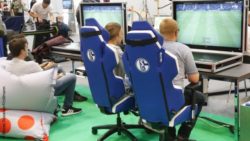
European digital inclusion strategies
13/11/2019
The 2nd M-Enabling Forum Europe took place on September 19, 2019 at the Congress Center of Messe Düsseldorf during REHACARE. The conference demonstrated the importance of promoting digital inclusion and accessible and assistive technology for persons with disabilities and senior citizens.
Teens with autism can master daily living skills when using video-prompting
08/11/2019
As adults, individuals with autism spectrum disorder (ASD) can be highly dependent on family members or assistance programs for their day-to-day living needs. Research has shown that people with ASD are strong visual learners. With technological advances, devices such as smart phones and tablets have become more portable and ultimately, accessible to caregivers.
Games and eSports: expanding participation opportunities
02/05/2019
An estimated 34 million Germans play computer and video games using a host of different devices. Between three and four million of them fall into the eSports category. REHACARE.com has taken a closer look to find out why some German institutions have difficulties defining eSports as real sports and examined how sports simulation games offer people with disabilities the opportunity to participate.
Accessible travel from booking to dream destination: ship ahoy
01/04/2019
Prefer to book online or use a travel agent? Looking for destinations across the Atlantic or fancy vacationing in Europe or exploring your own country? Staying at a hotel or hanging out with the locals? A recent online survey asked people with disabilities and their family members about their travel habits. REHACARE.com has reviewed the study findings.
Self-determined living: careunities creates flat sharing for people with physical disabilities
24/01/2019
For many people, living in a shared accommodation is a matter of course. But how well does this work if you have a physical disability and require assistance? This is where careunities comes in. The online platform matches people up with future roommates and also plans to retrofit buildings for accessibility, thus creating more shared living spaces.
MemoreBox by RetroBrain: Where rehabilitation meets fun
20/12/2018
Doing something good for your health in a playful and fun way – that sums up the concept of health games. "It does not have to be grueling, boring and dreadful to maintain or regain your health," says Manouchehr Shamsrizi. He co-founded RetroBrain and developed the MemoreBox – an easy-to-use gaming console for aging adults, designed to keep them physically and mentally healthy and fit.
Leicht. Bewerben.: "Simple Language can break down online barriers and communicate content so everyone can understand"
22/11/2018
Writing an informative job application can be hard but it’s crucial if you want to find a job. Especially young people with learning disabilities often struggle with this feat. That’s why the KulturLife non-profit organization has launched the "Leicht. Bewerben" project (English: Applying. Made Simple).
"TiPY is designed to accomplish the same things with one hand as you can with a standard two-handed keyboard"
25/10/2018
Microsoft has led the way and launched an adaptive controller to enable people with physical disabilities to have nearly the same complete gaming experience as people without disabilities. Mattheaus Drory achieved a similar result. In this interview with REHACARE.com, he admits that he initially didn’t necessarily have people with disabilities in mind when he developed his one-handed keyboard.
M-Enabling Forum: "The best assistive technologies cannot be useful if our digital environment is not accessible"
21/06/2018
Self-determined living needs accessibility. This does not only apply to step-free entrance for wheelchair users, but also for the digital environment. For example, when blind people surf the internet with a screen reader, they need web sites that are accessible. But reality often looks different. Reason enough for the M-Enabling Forum to focus on this topic at this year's REHACARE.
"Computer and video games are a social and inclusive medium"
14/12/2017
Countless Let’s Play videos on YouTube show that gaming has become an integral part of society. Whether people use consoles, PCs, laptops, smartphones or tablets, you can play on almost any platform. But what about accessibility in the age of better and better graphics and increasingly interactive game design?
Capjob: "People with severe disabilities assist job seekers with severe disabilities"
13/07/2017
Modern and user-friendly: job seekers are able to indicate their type of disability on the Capjob.de employment portal and search for jobs that are right for them. REHACARE.com spoke with founder Felix Hüning about the unique features of Capjob and why virtually all parties could benefit from an inclusive employment landscape.
Inclusive storyteller: "You can definitely make a difference and change things"
24/11/2016
There are some unique and interesting stories about accessibility and disability. Martin Habacher is someone who tells these stories. His goal is to find and then share them with the world on his YouTube channel. REHACARE.com spoke with Martin Habacher about his most beautiful story and his motivation to look beyond what he sees.
Looking for and finding inclusive shared housing options at WOHN:SINN
16/08/2016
A look at the living situation of many people with learning disabilities reveals they often only get to choose between living in care homes or their families’ homes. Many of them are not aware of the numerous inclusive shared housing options that gradually emerge in Germany and where people with or without disabilities live together.
"Ability4Refugees platform wants to provide auxiliary means for refugees with disabilities"
24/05/2016
Many people who had to leave their home country traveled in a wheelchair or used crutches. The stress of this escape was at times even more exhausting and taxing for some than for others. REHACARE.com spoke with Sigrid Arnade (ISL e.V.) and Eva-Maria and Andreas Mohn (Andreas Mohn Foundation) about the Ability4Refugees platform that aims to improve the availability of auxiliary means for refugees.
"PIKSL focuses on the removal of digital barriers"
26/01/2016
Digital transformation does not only cause problems for persons with disabilities. Companies are also facing digital barriers they need to overcome. The PIKSL Lab makes digital inclusion its priority: together, individuals with and without disabilities work on removing digital barriers. In this interview with REHACARE.de, Project Manager Tobias Marczinzik explains the PIKSL concept.
"We need to remove obstacles as a society to make participation for persons living with rare diseases possible"
27/10/2015
It is estimated that there are over 6,000 types of rare diseases worldwide. Diseases are considered rare when less than 5 in 10,000 persons are affected by a specific disease pattern. Hardly any qualitative information about diagnosis, treatment or networking opportunities is available. Project Manager Martin Frank explains how a new Information Portal for Rare Diseases would like to change that.